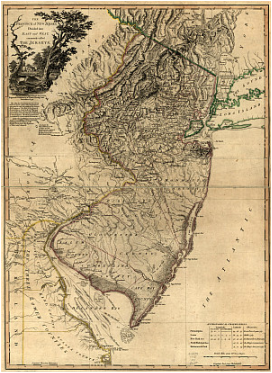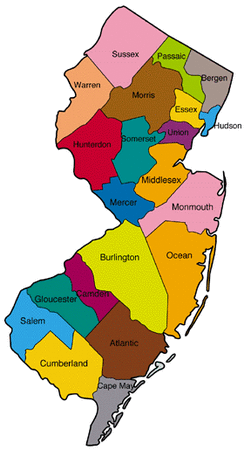-- Government - Counties
|
Home
* History * Population * Government * Politics * Lobbyists * Taxes * State Symbols * Biographies * Economy * Employers * Real Estate * Education * Recreation * Restaurants * Hotels * Health * Environment * Stadiums/Teams * Theaters * Historic Villages * Historic homes * Battlefields/Military * Lighthouses * Art Museums * History Museums * Wildlife * Climate * Zoos/Aquariums * Beaches * National Parks * State Parks * Amusement Parks * Waterparks * Swimming holes * Arboretums More... * Gallery of images and videos * Fast Facts on key topics * Timeline of dates and events * Anthology of quotes, comments and jokes * Links to other resources |
Government
* Governor * Legislature * Courts * Counties * Municipalities * Taxes * Politics/elections * Political history * Lobbyists --Origins
New Jersey's first counties were created following the 1676 division of the colony into the Provinces of East and West Jersey after Lord John Berkeley sold his half of the colony to a group of Quakers led by John Fenwick. The Quaker-owned western section comprised what was then known as Burlington and Salem counties; East Jersey was divided into Bergen, Essex, Middlesex, and Monmouth counties. In later years, after the two provinces were again united, the original six counties were divided over time to form fifteen new counties, eventually making up the twenty-one counties of the current state. Even after re-unification into a single colony, the counties of the former West Jersey retained some heritage of their period under Quaker governance, such as the use of large townships as the most frequent municipal plan of government and providing county government with greater responsibilities than was typical in the East Jersey counties, which were more oriented to home rule traditions recognizing the autonomy of boroughs, villages and towns. --Names The most frequent source for the names of New Jersey counties are place names in England (Burlington, Camden, Cumberland, Essex, Gloucester, Sussex, Monmouth, Middlesex, Salem, Somerset, Sussex, Warren). Other counties derived names from prominent explorers (Hudson, Cape May); geographic features (Atlantic, Ocean); colonial governors (Morris, named after Royal Governor Lewis Morris); and revolutionary leaders (Mercer, named after General Hugh Mercer, mortally wounded in the Battle of Princeton). Passaic County is adapted from the Lenni Lenape word "pahsayèk," usually translated as "valley." The name of Union County, formerly part of Essex and the last county to be established in 1857, reflects an affirmation of the national union in the years of dissension leading to the Civil War. The origin of Bergen County's name is in some dispute, with most believing it comes from the Netherlands, the origin of many of its first settlers, but others contending it refers to a Norwegian town or early settler to Nieuw Amsterdam. --Population and Demography
Counties with the largest populations in the 2020 US Census were Bergen (955,732); Essex (863,728); Middlesex (863,162); Hudson (724,854); and Monmouth (643,615). The smallest populations were reported in Salem (64,837); Cape May (95,263); Hunterdon (128,947); and Sussex (144,221). Hudson County had the highest rate of population growth in New Jersey from 2010 to 2020; its 14.3% increase was over twice the 5.7% growth recorded statewide. The populations in Essex, Hudson and Ocean counties all increased by more than 10%. Only four counties--Cape May, Cumberland, Salem and Sussex--lost population. * New Jersey State and County Quick Facts, US Census Bureau |
|

